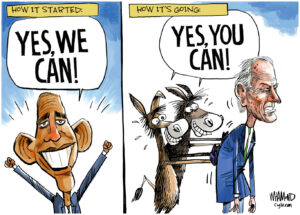A Common-Sense Approach to Social Security
In this summer of our economic discontent, it isn't necessary to manufacture a financial crisis or to make political hash out of discussing a nonexistent one.In this summer of our economic discontent, it isn’t necessary to manufacture a financial crisis or to make political hash out of discussing a nonexistent one.
So I’m baffled at why the subject of Social Security keeps popping up in the presidential campaign, and all the more so because neither Republican John McCain nor Democrat Barack Obama can manage to talk coherently about it.
McCain is guilty of head-spinning turns. Having once been a supporter of partially privatizing the vast retirement and social insurance system, McCain has been more consistent during the campaign in supporting a bipartisan panel similar to the 1983 Greenspan Commission to work out future financing problems. Everything, McCain said, has to be “on the table.”
Predictably, this bit of straight talk raised the hackles of the conservative anti-tax lobby — always antagonistic toward McCain. So McCain switched back to a strict anti-tax rhetoric, but in almost the same breath said again that he would support a bipartisan commission that looks at all options.
Got all that?
More consistent, but no more comprehensible, is Obama’s idea of creating a “doughnut hole” in the payroll tax structure that supports Social Security. Currently, payroll taxes are capped at earnings of $102,000 — that is, someone earning more than that does not pay Social Security taxes on the rest of his or her salary. The workers’ eventual benefits also are capped in line with taxes paid.
Obama says he would raise taxes to help finance the system, but only on those who earn $250,000 a year or more. His campaign refuses to say what percentage tax increase would be imposed, or even whether it would be a payroll or an income-tax hike. More significantly, the Obama campaign does not discuss what would happen to benefits after such an unprecedented shift in how taxes are levied.
Since Social Security’s inception, workers have received benefits that are roughly linked to the taxes they’ve paid into the system. This element of fairness is what keeps the program politically popular, and prevents it from being viewed as welfare. Would some future commission on Social Security go along with adding such complexity — let alone changing the basic bargain that has served the program so well, for so long? Probably not.
Luckily, the heat of summer has produced at least one proposal that sheds light, and logic, on the debate. The American Academy of Actuaries — an independent, professional group that has never before endorsed a particular method of bringing Social Security into long-term balance — is calling for an increase in the retirement age.
I know this isn’t what people want to hear. Economic stress is so serious now that to mention one more sacrifice is almost too much to bear. As for me, I’ve been working since I was 14 and don’t want to wait a day longer than necessary to retire.
The actuaries do not suggest a specific age (the current age to claim full benefits rises gradually to 67 for those born in 1960 and later). Nor do they estimate how much money a gradual increase would save the system.
What they do is present a compelling argument that makes far more sense than any politician’s garble. “It’s a demographic solution to a demographic problem,” says Bruce Schobel, who chairs the academy’s retirement security task force. In 1940, a 65-year-old man lived 12 more years, on average, and females lived about 13. By 2007, those figures had reached about 17 years for men and 19 for women.
The choice of 65 as the normal retirement age when Social Security was created in 1935 was driven entirely by cost estimates, Schobel says, and 65 was a compromise. The only change in the normal retirement age since then was the gradual boost to 67, enacted in 1983.
Privatizing Social Security sets up clear winners and losers, harming women and low-wage workers in particular. Raising taxes through Obama’s “doughnut hole” produces different classes of Social Security taxpayers and beneficiaries, fundamentally changing the nature of the program. Tinkering with benefit calculations has different impacts on various groups of workers.
But if we want to keep Social Security fair, if we want a long-term solution to treat all recipients as equally as possible, and if we want to do it in a way that is straightforward and understandable — not so convoluted that few could understand how the change would affect them — there is solid reasoning, and not political sleight of hand, behind the actuaries’ plan.
Marie Cocco’s e-mail address is mariecocco(at)washpost.com.
© 2008, Washington Post Writers Group
Your support is crucial…With an uncertain future and a new administration casting doubt on press freedoms, the danger is clear: The truth is at risk.
Now is the time to give. Your tax-deductible support allows us to dig deeper, delivering fearless investigative reporting and analysis that exposes what’s really happening — without compromise.
Stand with our courageous journalists. Donate today to protect a free press, uphold democracy and unearth untold stories.






You need to be a supporter to comment.
There are currently no responses to this article.
Be the first to respond.